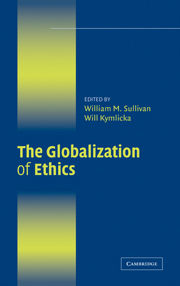Book contents
- Frontmatter
- Contents
- Contributors
- Acknowledgments
- 1 Introduction: The Globalization of Ethics
- 2 Global Ethics and the International Law Tradition
- 3 Morality and Universality in Jewish Thought
- 4 Globalization and Christian Ethics
- 5 Buddhism and the Globalization of Ethics
- 6 Muslim Perspectives on Global Ethics
- 7 Confucianism: Ethical Uniformity and Diversity
- 8 Natural Law, Common Morality, and Particularity
- 9 Liberalism and the Globalization of Ethics
- 10 Feminist Perspectives on a Planetary Ethic
- 11 Ethical Universalism and Particularism: A Comparison of Outlooks
- Appendix: Key Documents on Global Ethics
- Bibliography
- Index
10 - Feminist Perspectives on a Planetary Ethic
Published online by Cambridge University Press: 03 September 2009
- Frontmatter
- Contents
- Contributors
- Acknowledgments
- 1 Introduction: The Globalization of Ethics
- 2 Global Ethics and the International Law Tradition
- 3 Morality and Universality in Jewish Thought
- 4 Globalization and Christian Ethics
- 5 Buddhism and the Globalization of Ethics
- 6 Muslim Perspectives on Global Ethics
- 7 Confucianism: Ethical Uniformity and Diversity
- 8 Natural Law, Common Morality, and Particularity
- 9 Liberalism and the Globalization of Ethics
- 10 Feminist Perspectives on a Planetary Ethic
- 11 Ethical Universalism and Particularism: A Comparison of Outlooks
- Appendix: Key Documents on Global Ethics
- Bibliography
- Index
Summary
Introduction: Feminism as an Ethical Tradition
Feminism is not easily categorized either in singular terms (as one way of looking at the world) or in terms that are purely ethical. The label ‘feminism’ acts as an umbrella term covering a variety of ideologically distinct normative positions and a vast array of political struggles. Moreover, it is a label that is more readily defined in terms of political than of moral ideals. Feminists are concerned with understanding and addressing the ways in which gendered relations of power work to systematically oppress, subordinate, or exclude women's needs and interests. But the interpretations and critiques of gendered relations of power, and the ideas of women's needs and interests within feminism, are so varied that they cannot be said to reflect a unitary set of moral values. It might be claimed that all forms of feminism aim for equality, justice, and freedom for women. However, for some feminists, this aim is legitimated by a deontological liberal morality, whereas for others, for example, it is legitimated by the primacy of ‘feminine’ moral values of nurture and care. Moreover, the meaning of equality, justice, and freedom for women ranges in feminist thought from adjustments of current practice within liberal states to the wholesale transformation of the world as we currently know it. This makes for considerable difficulty in offering a coherent response to the question of what a global ethics might look like from a feminist perspective.
- Type
- Chapter
- Information
- The Globalization of EthicsReligious and Secular Perspectives, pp. 171 - 190Publisher: Cambridge University PressPrint publication year: 2007
- 1
- Cited by

